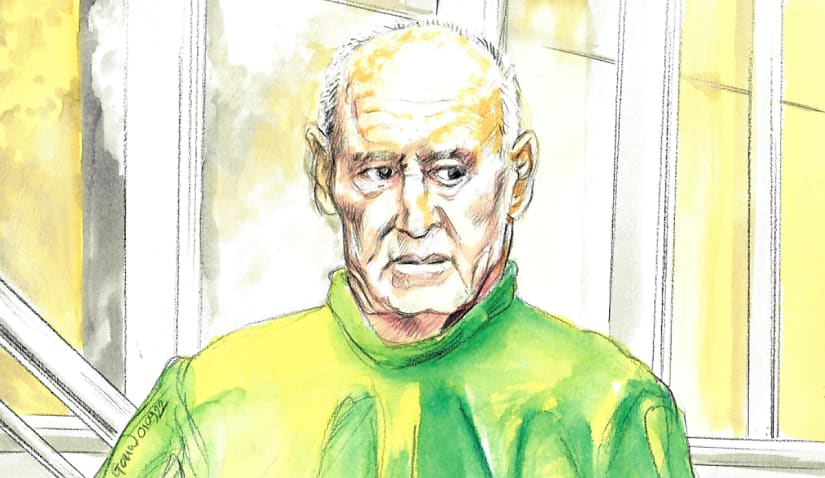Chris Dawson succeeded on two of the five grounds in the appeal of his murder conviction – but it was not enough to free him. Here’s why.

Chris Dawson court sketch. Credit: court artist Vincent de Gouw
Dawson will see out the remainder of his 24-year prison sentence for the murder of his wife, Lynette Simms, after NSW’s Criminal Court of Appeal knocked back his appeal on Thursday (13 June) afternoon.
It meant that for the second time, a court was persuaded Dawson murdered Simms on 8 or 9 January 1982 to make way for JC, the then-teenage girl who had been hired to babysit their kids.
In agreeing with Justice Adamson, Court of Appeal president Justice Julie Ward said the “circumstantial case” against Dawson was so compelling that there was “no reasonable doubt” as to his guilt.
Justice Anthony Payne was also satisfied, having written that the Crown’s case, made up of “11 pillars”, was successful.
Those pillars included the impossibility of Simms voluntarily leaving her children, who she doted on, and her possessions; the evidence about the “obsessive” nature of Dawson’s relationship with JC; and his behaviour that was “completely irreconcilable with any purported belief that the deceased might return to the marital home” in Bayview.
Dawson succeeds on 2 grounds, falls short on three
Dawson claimed Justice Ian Harrison, the original trial judge, failed to take into account the “significant forensic disadvantage” he was at because the crime was over 40 years old.
He also contended Justice Harrison’s verdict was not supported by the evidence, and he was the victim of a substantial miscarriage of justice because his evidence of a phone call was discounted.
Dawson failed on all three grounds.
However, he successfully made out that Justice Harrison erred by acting upon alleged lies to support an inference of consciousness of guilt in circumstances where they were not relied on by the Crown.
Specifically, the Crown relied on five discrete lies. Justice Harrison’s judgment went further and considered other lies.
During the appeal hearing, the Crown accepted Justice Harrison’s language was “problematic” because Justice Harrison used those lies when he referred to “consciousness of guilt”.
Justice Harrison’s reasons as to why he acted on those alleged lies were also found to be “inadequate”, as pressed by Dawson.
In the appeal judgment, Justice Adamson wrote that what it boiled down to was the “important distinction” between the lies.
There are those that, under strict conditions, implied admission because they evince a consciousness of guilt on the part of the accused, known as Edwards lies.
The others, referred to as Zoneff lies, are relevant to the credibility of versions given by the accused to others, including police, and their own evidence if they do choose to give it during proceedings.
Senior public defender Belinda Rigg SC said Justice Harrison used statements and omissions by Dawson as Edwards lies, failed to distinguish them, and did not explain whether – and if so why – the Edwards conditions had been satisfied.
While Justice Harrison was entitled to “consider the whole of the evidence” and was not confined to specific matters relied on by the Crown in its closing submissions, Justice Adamson said he was not permitted to use evidence as a consciousness of guilt “which had not been specifically identified as such by the Crown”.
Justice Adamson went on to say Justice Harrison could only use those lies “if the Edwards conditions were met”.
Proviso keeping Dawson behind bars
Rigg said the failures with the Edwards and Zoneff lies meant there had been a denial of procedural fairness and Dawson was entitled to have a new trial so the evidence could be reconsidered.
However, at the appeal hearing, the Crown said even if the grounds were made out, the court should still dismiss the appeal on the basis that it considered there has been no substantial miscarriage of justice.
Justice Adamson agreed.
In the judgment, she said the Crown proved beyond a reasonable doubt Dawson killed Lynette so he could move JC straight into the Bayview home and the marital bed.
“For these reasons, I am satisfied that the proviso applies in the present case,” Justice Adamson wrote.
“I consider that no substantial miscarriage of justice has actually occurred as a result of the errors established in grounds two and three and that the appeal ought be dismissed.”

Naomi Neilson is a senior journalist with a focus on court reporting for Lawyers Weekly.
You can email Naomi at: